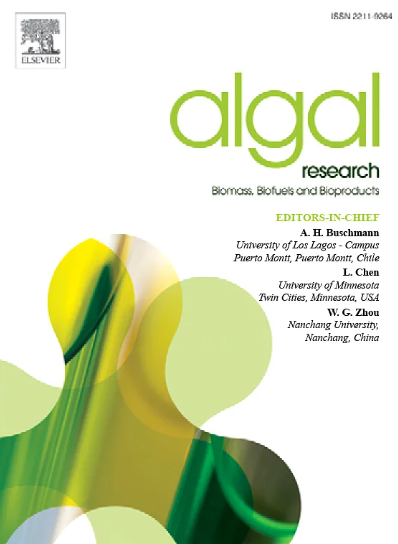Exploring algal diversity for enhanced nutrition: Implications for human health and sustainability
IF 4.6
2区 生物学
Q1 BIOTECHNOLOGY & APPLIED MICROBIOLOGY
Algal Research-Biomass Biofuels and Bioproducts
Pub Date : 2025-01-10
DOI:10.1016/j.algal.2025.103907
引用次数: 0
Abstract
There has been a high demand for sustainable and nutrient-rich protein sources due to the increase in global population. In the search of protein source, algae have emerged as a promising nutrient-rich protein source with abundance, high-value nutritional components, and environmental sustainability. This review investigates the diverse nutritional potential of algae, focusing on their importance to human health and nutrition. Algal biomass, encompassing both microalgae and macroalgae, is rich in essential nutrients such as proteins, vitamins, lipids, minerals and bioactive compounds. Microalgae, notable for their high biomass productivity and resilience to various environmental conditions, are particularly valued for their nutritional benefits. Macroalgae offer distinct nutritional advantages, making them as a popular dietary staple. The review highlights the critical role of algae in addressing malnutrition and managing lifestyle-related disorders, including cardiovascular health and immune function enhancement, as evidenced by marine algal polysaccharides from species like Porphyra haitanensis, Enteromorpha prolifera, Enteromorpha clathrata, which demonstrate the cardioprotective effects through gut microbiota modulation. Sustainable production and harvesting techniques further highlight their potential as a viable, eco-friendly protein source for the future.
求助全文
约1分钟内获得全文
求助全文
来源期刊

Algal Research-Biomass Biofuels and Bioproducts
BIOTECHNOLOGY & APPLIED MICROBIOLOGY-
CiteScore
9.40
自引率
7.80%
发文量
332
期刊介绍:
Algal Research is an international phycology journal covering all areas of emerging technologies in algae biology, biomass production, cultivation, harvesting, extraction, bioproducts, biorefinery, engineering, and econometrics. Algae is defined to include cyanobacteria, microalgae, and protists and symbionts of interest in biotechnology. The journal publishes original research and reviews for the following scope: algal biology, including but not exclusive to: phylogeny, biodiversity, molecular traits, metabolic regulation, and genetic engineering, algal cultivation, e.g. phototrophic systems, heterotrophic systems, and mixotrophic systems, algal harvesting and extraction systems, biotechnology to convert algal biomass and components into biofuels and bioproducts, e.g., nutraceuticals, pharmaceuticals, animal feed, plastics, etc. algal products and their economic assessment
 求助内容:
求助内容: 应助结果提醒方式:
应助结果提醒方式:


